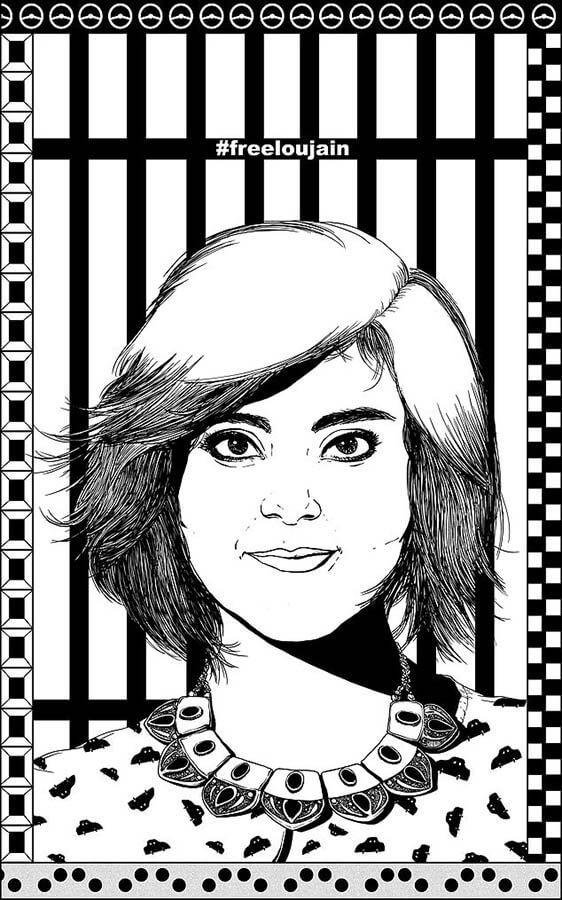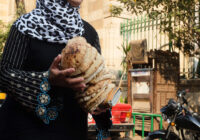May 15 marks an unhappy anniversary for Saudi activist Loujain al-Hathloul and all those who care about women’s rights everywhere.
“I always wished I was a man, always, since I was a child.” In her home country of Saudi Arabia, Loujain al-Hathloul is a controversial figure. Her habit of speaking, and acting, out in support of women’s rights has caused her to be labeled abrasive, a troublemaker and even an attention seeker among more conservative elements of her society — by women as well as men.
The woman I meet in a bright modern apartment is warm, vibrant and unexpectedly gentle in manner. She is also quick to defend the men in her own life. “My male guardians have been angels to me,” she says smiling. “I know I’ve had it much easier than most Saudi women … but it didn’t make me any less aware that I could have everything faster, more directly, if only I were a man.”
Her courage in fighting to secure the same rights as male citizens in Saudi Arabia has won her international acclaim. It is also the reason why I cannot sit with her today to talk about the country’s new driving schools for women or congratulate her on passing the master’s program in sociology she had undertaken in Abu Dhabi since we met. Loujain never saw the women of her country drive, nor did she graduate.
Almost exactly a year after our meeting in her Dubai home, Loujain was arrested on May 15, 2018, without warning in a sting operation that also claimed a dozen other peaceful women’s rights activists. Today marks the one-year anniversary of her imprisonment.
The Struggles of Loujain al-Hathloul
Loujain’s struggle against the patriarchal restrictions of her society began almost as soon as she could talk. “My father was in the navy,” she began that day, describing her early childhood living on coastal military compounds while she poured me a thimble-sized cup of bitter, Arabic cardamom coffee. “He had this fear of his children being surrounded by water but not knowing how to swim. The only public swimming pool was for men, so when I was 3 years old, he put me in a pair of my brother’s swimming trunks and brought me along.”
His act, predictably, caused a scandal among fellow swimmers: “How dare you bring a half-naked girl in here!” she mimicked with mock sincerity. “But my dad just looked at them and said, ‘If you’re aroused by a little kid, then you really need to get yourselves checked. That’s a pretty serious problem,’ and threw me in.”
After a few weeks, other fathers started bringing in their own little girls. “That was my first experience of a feminist movement,” Loujain chuckled. “I guess I learnt pretty early on I couldn’t just sit there and wait to be given my rights.” Neither could she wait for others to be given theirs.
Her younger sister, Lina, recalls her own childhood dream of learning to box — a request that was firmly opposed by both her parents. She remembers her older sister’s response. “Loujain marched downstairs to confront our mother. ‘Why isn’t it acceptable for a girl to do boxing?’ she asked … ‘Who made these rules?’ Why can’t they be changed? … a few weeks later, I was ducking between the ropes of a boxing ring,” she says proudly, “but I never learned to fight like my sister.”
Like many female Saudi activists, Loujain’s platform grew dramatically with the boom of social media in her country. From her dorm room in Canada, where she completed her undergraduate studies, she started vlogging. Her hair and face uncovered, she caused a sensation, talking about subjects such as female freedom of expression, abuses of male guardianship and especially on women’s right to drive. But not all her fellow advocates welcomed her input.
“People said I was a hypocrite,” she explained. “They said it was wrong to push women to participate in such a dangerous activity while I was being protected by a Western country. I had to agree with them.” In 2013, she flew to Saudi Arabia and drove herself home from Riyadh airport; her father filmed her at the wheel.
Loujain was not formally punished for her act. Instead, it was her guardian, her father, who was called into a meeting at the Ministry of Interior and reprimanded for her transgression. It is an episode that still infuriates her. “It’s an indirect way of disregarding women’s existence and their movement,” she said, her usually cheerful expression momentarily darkening.
Loophole
A few months later, Loujain stumbled on an idea for a more ambitious plan. “While I was working in the UAE, I got a driver’s license,” she said. “When I looked at it carefully it dawned on me that it had the GCC stamp on it.” In theory, any document bearing this stamp is valid in all six countries of the Gulf Cooperation Council, Saudi Arabia included. “I had found my loophole.”
She didn’t tell anyone what she was going to do until she was already at the border. “It was only a week after I got married by the way,” she added as an aside, “my poor husband.” After 26 hours of confusion and communication with officials in Riyadh, she was arrested. This she had anticipated. What she had not expected was the severity with which her “crime” was treated.
She was charged under new domestic antiterrorism legislation and spent three months in jail. She didn’t know if she would be held for days or decades until she was suddenly released. But, she said, she had no regrets.
“I really enjoyed my time in jail,” she told me brightly. “I got to spend time with women from a different social circle, a different region, a different sect. I decided to take as much as possible from it, to face it with a positive attitude. Since I had nothing else to do, I thought I might as well look on the bright side.”
Loujain’s relentless positivity has become something of a trademark. Google her image and she beams back at you from a hundred formal portraits and family photographs, even those over which the word “traitor” has been inked in red Arabic print. Her refusal to give up hope is grounded in an unwavering love for her country.
It is important to note that Loujain, like almost all of the others she was arrested with, is an educated woman from a supportive family, who could easily have made a home for herself elsewhere, in a country where she wouldn’t have to fight to secure the basic rights of citizenship. She insists this was never really an option.
“There is a really beautiful side to Arab life,” she told me serenely, “you see it in our social life. We are a warm people, we are welcoming … I lived for a time in Vancouver and I had the most wonderful experience, but I couldn’t stay any longer because, to me, the people are too closed. I feel I belong more to the East than the West.”
Loujain told me how she dreamed of returning to Saudi Arabia and to her home province of Najd, the country’s most conservative region and home to the capital, Riyadh. “After being released I was on a travel ban,” she told me, “so I was forced to stay in Saudi for a year. And that was such a blessed year, I really loved staying there, I love the life there.”
Arrested in Dubai
When I met her in the UAE, she was making do with a life in the country next door, peppered with low-profile weekends back to see relatives and other activists. In the end, she did make it back home, but not in the way she had hoped.
According to accounts shared by her siblings, Loujain was kidnapped from the streets of Dubai by government officials, forced into an airplane and flown back to Saudi Arabia against her will. There she was held, first in an apartment at a secret location and later in a state prison.
This time it may be hard even for Loujain to add a positive spin to her experience behind bars. Lina recounts what happened the first time her parents were permitted to visit their daughter in jail: “My sister could barely speak normally. She couldn’t grip a pen, yet she smiled her dazzling smile and assured them she was OK.” In a later visit, she broke down in tears and told them the truth.
“These are the things my brave, resilient sister has endured in prison,” Lina recently told an audience at the Women in the World’s New York summit. “She has been beaten until her thighs were black with bruises, subject to whippings and water boarding, tormented with electric shocks, threatened with rape and murder.”
The refusal of her brothers and sisters to keep Loujain’s plight secret, as they had been instructed, make uncomfortable publicity for a nation working on an international media makeover. In the past year, Saudi Arabia has been rightfully proud of the leaps forward it has made in terms of women’s liberties: the first female ambassador has been appointed, women’s sport has lost its stigma and the infamous female driving ban has fallen. But what does all this mean if the very people who campaigned peacefully for such rights are denied their own freedom?
It has been a distressing year, not just for Loujain and her family, but for all those affected by this latest, and unexpected, crackdown. There has been relief for some in the past few weeks. Approximately seven of the jailed activists have been released “temporarily” pending the results of their ongoing trials. But of Loujain in such headlines, there has been no sign. The date of her last hearing was canceled abruptly without explanation. Since then, there have been no updates on her case and no news of when proceedings might be resumed.
As the country unites in the familial atmosphere of Ramadan, a month of compassion and forgiveness, her loved ones retain a flicker of hope that these virtues might yet be extended to their daughter, sister and friend. Today marks an unhappy anniversary for Loujain al-Hathloul and all those who care about women’s rights everywhere. Let us hope there will be no second.
Loujain was recently been nominated for a Nobel Peace Prize. At the time of her arrest, she was training to work as a sociologist, “in the hope of taking part in the change that is happening in my country as a researcher and a consultant,” she told me. I hope that by the next May 15, Loujain’s name will still be spoken often in Saudi society, not accompanied by whispers of “troublemaker,” but by the more worthy title of “change maker.”
The views expressed in this article are the author’s own and do not necessarily reflect Fair Observer’s editorial policy.
Support Fair Observer
We rely on your support for our independence, diversity and quality.
For more than 10 years, Fair Observer has been free, fair and independent. No billionaire owns us, no advertisers control us. We are a reader-supported nonprofit. Unlike many other publications, we keep our content free for readers regardless of where they live or whether they can afford to pay. We have no paywalls and no ads.
In the post-truth era of fake news, echo chambers and filter bubbles, we publish a plurality of perspectives from around the world. Anyone can publish with us, but everyone goes through a rigorous editorial process. So, you get fact-checked, well-reasoned content instead of noise.
We publish 2,500+ voices from 90+ countries. We also conduct education and training programs
on subjects ranging from digital media and journalism to writing and critical thinking. This
doesn’t come cheap. Servers, editors, trainers and web developers cost
money.
Please consider supporting us on a regular basis as a recurring donor or a
sustaining member.
Will you support FO’s journalism?
We rely on your support for our independence, diversity and quality.







